Hours before the celebration commenced, he quick-stepped across the grass, smiling, waving, and handshaking as a trickle of what became hundreds of Army supporters gathered at the service’s museum for a birthday celebration.
Sergeant Major of the Army Michael A. Grinston wove past the red and yellow bouncy house, a table of night vision devices he could have only dreamed of 36 years ago when he first laced up a pair of black combat boots, and an electric grid that could help solve the military’s petroleum-tied fueling problems.
The 55-year-old veteran of Desert Storm, Afghanistan and Iraq caught the eye, and the selfies of onlooker after onlooker long before the ceremony began.
His mere presence easily drew social media posts, people sharing their snapshots of the sergeant major.
It wasn’t the World War II-inspired uniform, subdued yet striking, nor the ribbons, medals and combat patch, though actions that led to those pieces of metal and cloth shaped the once-rebellious young Grinston.
The magnetic draw comes from his winsome smile, consistently high-powered, early rising, late-night working energy, and chameleon-like ability to connect with anyone he encounters, in person or through a screen.
The smile draws some in and a quick barb or wisecrack puts others at ease, but he’s also stressed his troops to their breaking points in peace and war. He shared his own struggles with the world in a way rare among those of his rank, some would say in too vulnerable a way for a career soldier. He gazes with the keen eye of the drill sergeant he once was, staring across decades of sweat and toil to ready soldiers. He engages the newest private even as he respectfully prods senior officers who could crush his career.
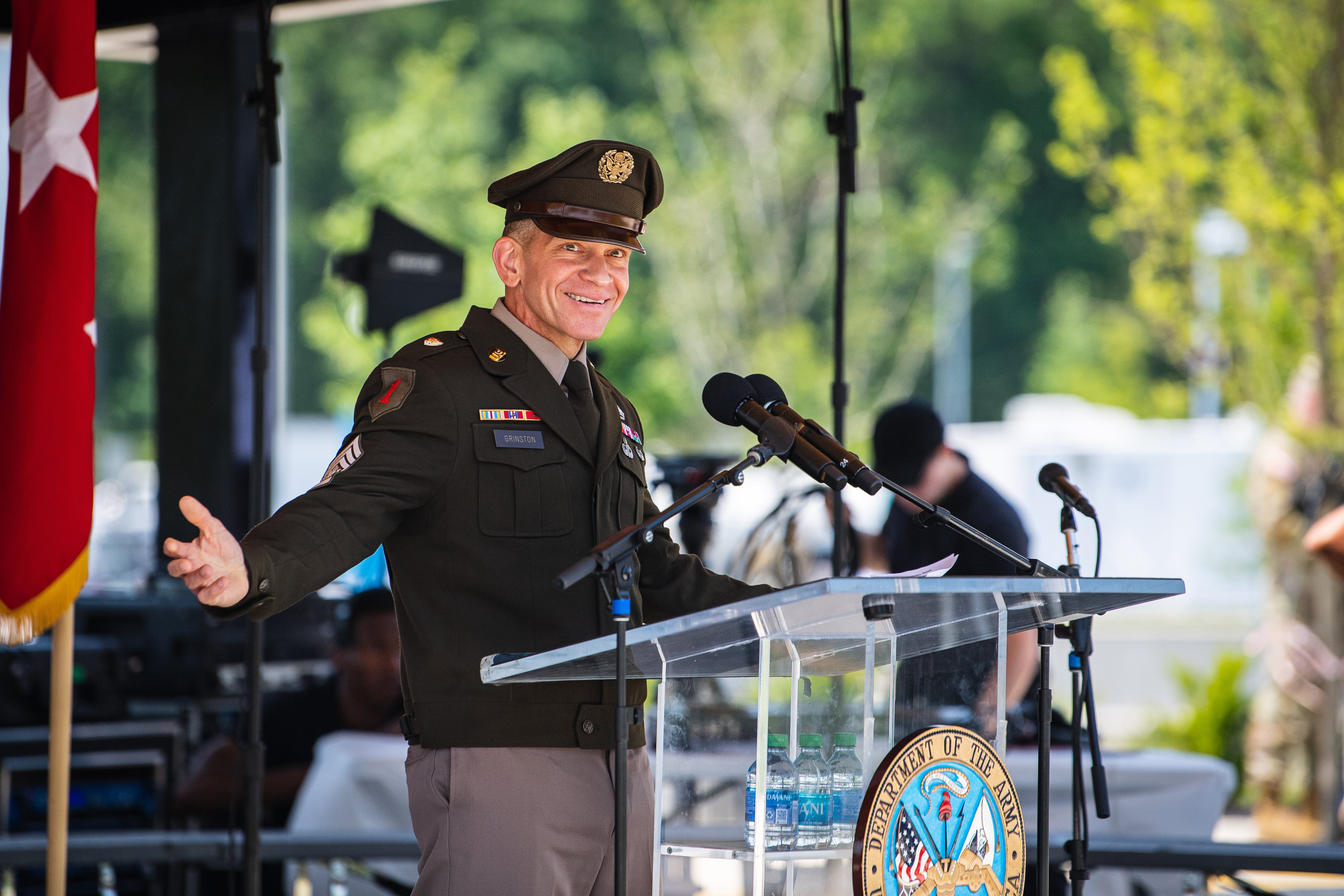
This 248th birthday celebration at the National Museum of the U.S. Army at Fort Belvoir, Virginia on a Saturday in June will be his final in uniform. In August he will remove Army greens for the last time, having left a very personal mark on an institution that prides itself on uniformity.
That mark extends beyond warm handshakes, across generations, linking the values of his elders, carried through his generation of soldiers, to fresh-faced kids now joining the ranks with expectations of openness, mentorship, and guidance that top leaders never before had to meet.
His tenure witnessed the ending of the nation’s longest war, a global pandemic, a leap forward in Army modernization — new technologies, weapons, vast reorganizations, a new approach to how the entity treats its people — a return to strategic warfare against China and Russia and never-ending political pushback as the Army courts a new generation it desperately needs to fill its ranks.
Talking at soldiers isn’t new. But it is the inspiring leader who simply shows up, in person, and now, online, with an authenticity that echoes across the drill fields, unannounced barracks visits that are more about seeing if leaders are caring for soldiers than if soldiers have left the latrine filthy, and now, more importantly than ever, streaming into the ever-present screen in each soldier’s pocket.
His consistent message for leaders to master their craft, build cohesive teams and defend their soldiers could have been used in any period of Army history. Yet, he managed to sound that message across social media in a way that top military leaders have tried and generally failed to do, at times resulting in very public missteps with potentially career-ending consequences.
Those communication methods and styles have set Grinston apart from his predecessors in a way that’s hard to pin down, but the result is a senior leader who comes across as approachable and earnest in the eyes of his soldiers, whether they’re meeting him in person, or seeing him online. Reams of social media comments applaud how he’s helped individual soldiers and shared his personal story all while driving home the fundamentals of good soldiering. Though many of his colleagues may care as deeply as Grinston does, few have found a way to make that translate effectively online.
That obstacle looms large as the services face daunting recruiting challenges and must find ways to reach an audience that’s been characterized as disengaged, dissolute and disinterested in service.
The Army in the years and decades to come, faces a choice: Will they follow the open, personal path that he has paved during his four-year tenure? Will they chart a new course?
Or will they close ranks and revert to the cold, official approach?
Hours later on this sunny day, he takes the microphone before the crowd.
“Happy Birthday! Isn’t it great?” he says, before handing off the podium to his boss, Chief of Staff of the Army Gen. James McConville
Next, he weaves his way through the crowd and across the field to the Army’s newest vehicle, the Mobile Protected Firepower system. Where he takes hold of a black sheet covering part of the 105mm barrel.
“And we are excited to announce that the MPF system will now be known as the M10 Booker Combat Vehicle,” McConville says to the applause of the few hundred gathered here.
Simultaneous to the boss’ words, Grinston pulls the black sheet, revealing white, all capital letters “BOOKER” on the gun tube. The combat vehicle is named for two soldiers, both killed in combat during valorous acts, one a World War II infantryman, the other an Iraq War tanker, one white, the other black. The men serve as stark reminders that while the face of the Army has changed, soldiers still perform heroic deeds and die in battle, regardless of color.
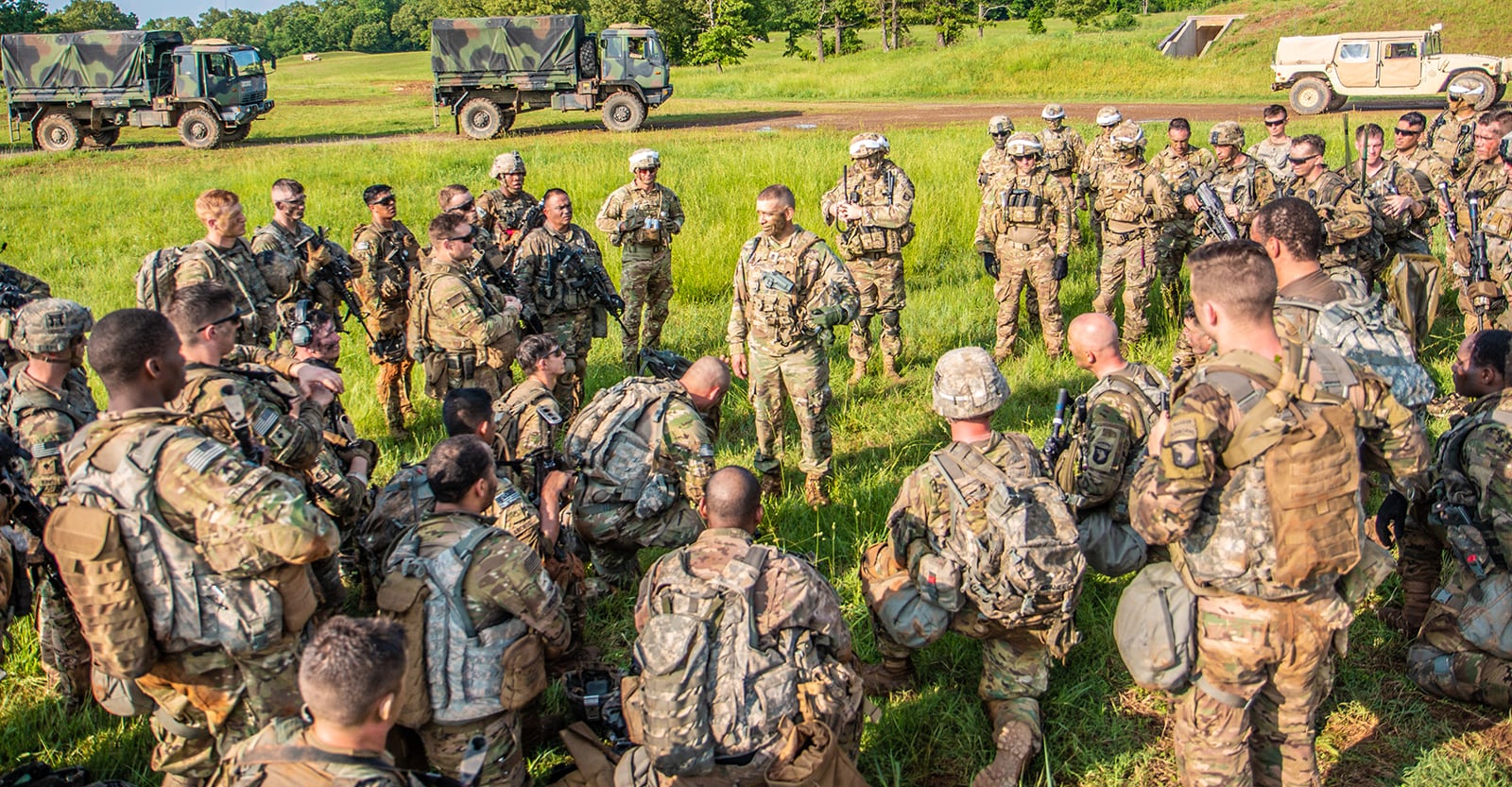
Grinston and McConville stand for crowd photos with soldiers, veterans, and civilians clad in T-shirts and shorts. Once enough selfies have been snapped, Grinston begins his quick-time march out, alongside his wife Alexandra. But not before he runs into a gaggle of two dozen, camo-clad, newly minted wheeled vehicle mechanics who stop him, asking for words of wisdom.
They kneel in a semi-formation huddle as Grinston peppers them with questions, first off, where are they being stationed?
The soldiers shout out a list of locations: Alaska, Germany, Schofield Barracks, Hawaii, South Korea — and South Korea again, this time followed by a very deliberate “sergeant major” — then Germany again, and a third time as well, though Baumholder, specifically.
Then he asks if they have any questions for him.
“Is it worth doing 20 years?” one asks.
He rattles off every corner of the Army he’s seen in his nearly 36 years, most of the locations they’re headed to shortly, Ranger School in 1990, before any of them were born. How he met his wife in Germany and had one daughter in Italy and the other in Germany, both now in college.
“So, is it worth it? 100 percent,” Grinston says.
They got their digital memory from the smartphone snap. They also pressed flesh with the real thing. Very little divides the two.
Grinston spent 20 years in the Army before ever encountering social media. He saw how missteps quickly got soldiers in trouble. Grinston still remembers when, as a sergeant major, he got a personal phone call from the sergeant major of the Army, at the time, who asked why a soldier in Grinston’s unit was posting negative things about leadership online.
“Well, what do you want me to do? I can call the soldier, but he’s gonna deny it,” he thought but did not say.
Years later, while serving under Gen. Robert Abrams, the general was shocked Grinston wasn’t on Twitter. Reluctantly Grinston, a good soldier, created his first Twitter profile.
Over time Grinston’s use of social media grew in small steps. By his second year as sergeant major of the Army, with the lockdowns of the pandemic, he saw this as another tool, much like a weapon — dangerous if handled carelessly, but effective if handled with forethought.
From his first days as an artillery cannon crewmember, a 13B military occupational specialty, defined in the job title as part of a “crew” his career may have prepared him for those challenges.
In the artillery community, its own subculture of the combat arms piece of the Army pie, cannoneers see everything through the cannon, a target and details mean everything.
“With artillery, you make one simple mistake and it’s all bad,” he said.
If he stayed close to his leadership values, some learned in uniform, some that formed in his youth, he might manage.
The railroad stop-town of Jasper, Alabama, rests on the way to the steel mills of Birmingham, nestled in the beginnings of where hills start to rise. The village of 10,000 in the early 1970s with a motto of “Working People, Working Together,” served as a nest of sorts. Especially so for the youngest child of three of a single white mother who’d gone through a divorce from her Black husband at a time when mixed-race couples faced open hostility and a single mother in the South received little sympathy from those outside the family.
Grinston’s mother Mary instilled in him a resolve, working a humble job delivering newspapers and marching him to church every Sunday. In his own words, she was the driving force in his life. Mary Claudette Grinston, 87, died on June 14, 2022, the Army Birthday.
Neighbors, teachers, coaches and shopkeepers saw Grinston as Mary’s son, another of the town’s children.
“I was definitely raised by a village,” Grinston said.
That wasn’t always true in the outside world and even now, more than five decades later he continues to get the odd sideways glance, the question he dreads, “What are you?”
His pat answer was, “Human, what are you?”
Now in his mid-50s, he says it’s often curiosity, not hate, he tells himself and others that “they don’t mean anything by it,” but the question is unnecessary.
“It’s not something you should ask anybody,” Grinston said.
No one needed to know about his background, he’d say to himself. Serving as a good soldier, that’s all he wanted.
He reluctantly told a fellow senior leader about his racial background following the 2020 George Floyd killing, which sparked widespread protests against racial injustices in policing. That leader urged him to share his story with soldiers anyway.
He feared pushback but he shared anyway.
While pushback came in many forms, one of the most recent happened only weeks ago. On a July 10, 2023, segment on the Newsmax show “Greg Kelly Reports” in which the host, Kelly, opens with criticism of military leaders pursuing a “woke” agenda in their focus on diversity in the ranks. Later in the hour-long show, Kelly points to a Twitter video posted in June 2020 by Grinston.
“I see Sgt. Maj. Grinstead [sic], this is the top enlisted man in the United States Army at the time…” Kelly says.
Kelly then plays a Twitter video that Grinston posted in June 2020, discussing his bi-racial background, in bits, pausing to comment on what Grinston said. As the recording proceeds, Grinston tells how he was born in Alabama in 1968 and that his father was Black, and his mother was white.
Kelly pauses the playback to say, “So what? And he let the entire Army know it. So, what, it doesn’t matter. It doesn’t matter, but divide us, please.”
The host continues the video playback until Grinston says, “racial identity is something I struggled with my entire life.”
Kelly pauses to say, “That’s not our problem. You didn’t have to, you chose to, in my opinion. Next.”
The video continues, Grinston explains an experience in which he marked “Black” on a form, instead of “white” and was chastised by the person who provided the form.
“And the relevance of this is, what? Nothing other than to involve himself in the political moment. And that is so wrong,” Kelly says. “Finally…”
Grinston continues, sharing an example he’s drawn from the film, “The Green Book,” in which a character says that he’s “not Black enough for the Black people and not white enough for the white people.” The sergeant major ends with the comment, “That’s my story.”
“That’s his story, huh? What about all the military stuff? He’s the Sergeant Major of the Army, in his 50s,” Kelly says. “This is what his story’s all about? How do we get here? How do we get here?”

Again and again Grinston took the risky approach, dropping the official veneer to show the person within the uniform as he connected with, and defended, his soldiers, his Army.
In March 2021, then-Fox News host Tucker Carlson, called President Joe Biden’s efforts to increase gender diversity by recruiting and retaining female troops a “mockery” of the military.
Multiple military senior leaders, including the secretary of defense, the Pentagon spokesman and others made public statements countering Carlson’s comments.
Grinston used Twitter to argue that Carlson’s “words are divisive and don’t reflect our values.”
A short time later the National Interest published an opinion piece titled “The Woke-Military Complex” that called out multiple senior military leaders, pointing specifically to Grinston, remarking that his and other leaders’ responses to Carlson showed that, “it’s actually quite alright to engage in politics while in uniform---so long as it’s the correct kind of politics.”
Those are two of the multiple criticisms Grinston received, but he had shared before and would continue.
Beyond the accusations of wokeness, Grinston has led during truly foundation-shaking events in the Army, none likely more impactful than the murder of Spc. Vanessa Guillénat Fort Hood, Texas on April 22, 2020, by a fellow soldier.
Before her death, Guillén had told her family she was being sexually harassed by a sergeant at the post, but she feared nothing would be done because reports by other female soldiers on the same sergeant had gone nowhere. She later went missing. Her remains were discovered on June 30, 2020.
As the investigation continued, the Army scrutinized Guillén’s chain of command, calling for an outside agency to conduct its own investigation.
But while the investigation rolled on, top Army leaders remained mostly silent, a common practice during investigations.
Following the release of the report, Grinston recorded a video message released on Dec. 8, 2020, noting the systematic failures of leadership at Fort Hood.
“But make no mistake, policy did not create the culture at Fort Hood,” Grinston said. “Policy means nothing without leaders who enforce it,” Grinston said.
Those close to Grinston said that he questioned the initial lack of public response by the Army following Guillén’s death.
But through it all, Grinston seems to have navigated the mine-filled terrain of the online landscape mostly unscarred, at least compared to some of his colleagues.
One of the more prominent cases involved Maj. Gen. Patrick Donahue.
Reports emerged in September 2022, Maj. Gen. Patrick Donahoe, a decorated leader at the helm of one of the Army’s most vital institutions — the Maneuver Center of Excellence, that the Army had paused his retirement process, awaiting the findings of an inspector general’s investigation of allegations, some of which included inappropriate dealings with subordinates and unprofessional online conduct when responding to criticisms of female soldiers.
In a February 2023 article by Army Times, Donahoe, then retired, reflected on the allegations, few of which were founded, and defended his social media use, while also criticizing the Army’s lengthy inspector general process that dogged the final year of his career, based, he said, on a handful of largely unsubstantiated claims by a handful of disgruntled officers and some of the allegations stemmed from his own online defense of female soldiers.
But last fall, Donahoe had become the example of what not to do online for many high-ranking circles. Some of those closest to Grinston urged him to stay quiet online when responding to outside attacks on gender or diversity.
Grinston asked his advisors a simple question — what does Army policy say?
“…Army personnel, especially those entrusted with the mantle of leadership, will lead by example and do what is right to prevent abuse treatment of others,” 600-20 “Army Command Policy” Section 4, paragraph 19 reads.
The policy notes the defense can be online or in person.
Like a Sunday preacher consulting scripture, Grinston looked to the text, and took from it guidance on what the Army has asked of its leaders, at least in its official language, long before social media existed.
Within days of arriving at his second posting at Fort Campbell, Kentucky in 1990, an intake noncommissioned officer noted Grinston’s record book with high fitness and marksmanship scores. Leadership sent him to a fitness test, the range and Air Assault School within a week. The 13B cannon crew member then got a coveted Ranger School slot, an occurrence so rare, Grinston later estimated there might have been 10 soldiers with his MOS and Ranger tabs in the Army at the time.
Currently, there are 36 cannon crewmembers with Ranger tabs in the combined active, Guard and Reserve Army of 1 million soldiers, according to data provided by Army spokeswoman Heather J. Hagan.
Grinston said getting the “tab” likely led to leadership opportunities that, citing his time as an artilleryman leading premiere infantry units in the 10th Mountain Division and in the 173rd Infantry Brigade Combat Team (Airborne), he never otherwise might have had.
The tab also made an early impression on a handful of soldiers who still call him a friend today.
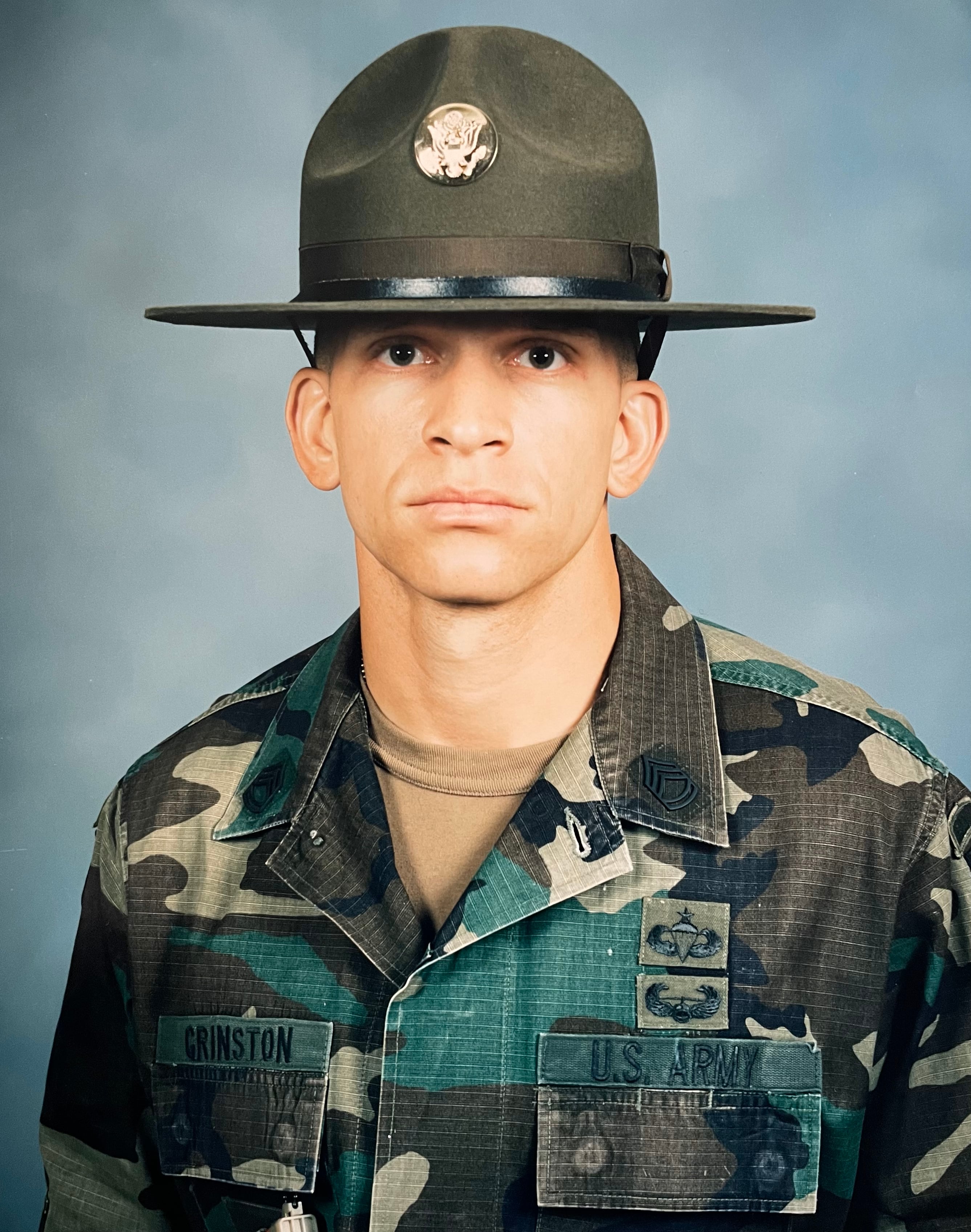
On Aug. 2, 1990, O’Neil Brown was on duty, hoping he could finish his shift and get some sleep.
Iraqi dictator Saddam Hussein had other plans. His military invaded Kuwait, ruining Brown’s sleep routine.
Not long after Brown saw the world-changing news, the phone rang. It was Sgt. Grinston using one of his rare phone calls in Ranger School to check on Brown and the unit. Are they ready? What’s happening?
They were packing up, preparing to head to Saudi Arabia along with an eventual half-million U.S. troops.
The unit left for the Middle East, Grinston finished Ranger training, got his tab and joined them.
The two men had previously met in the 2nd Battalion, 320th Field Artillery Regiment at Fort Campbell. Brown first thought that Grinston’s nonstop energy was too much.
“Man, please take that ‘gung-ho’ stuff somewhere else,” Brown said. But the gung-ho sergeant proved his worth when Brown had a pay issue that wasn’t getting fixed.
Grinston marched the specialist up to the administration offices and found a sergeant first class to air this grievance. The two-ranks-above soldier blew off Grinston.
Rather than retreat, Brown recalls, Grinston told the senior sergeant, “I don’t care what you do I’m not leaving here until you fix his pay.”
And that’s what happened.
Later, Grinston would push Brown on runs without him knowing, take him to the obstacle course to practice rope climbs and out on a rainy Saturday to rappel off 80-foot cliffs so that Brown could pass Air Assault School.
“He has a way of making you want better for yourself,” Brown said.
Retired Col. Kyle McClelland, the officer who, decades later, would recommend Grinston as a potential sergeant major of the Army, remembers in 2003 talking with his brigade command sergeant major and asking the career-infantry soldier of the unit’s first sergeants.
A week later, he returned.
“I can tell you head and shoulders above them all is 1st Sgt. Grinston,” he said.
Over the next year, Grinston was the taskmaster that, as then-Lt. Brendan Dignan said, took a “ragtag group of somewhat overweight, smart but moderately undisciplined soldiers and turned them into one of the best artillery batteries in the Army.”
That training would serve them well for what they were about to face.
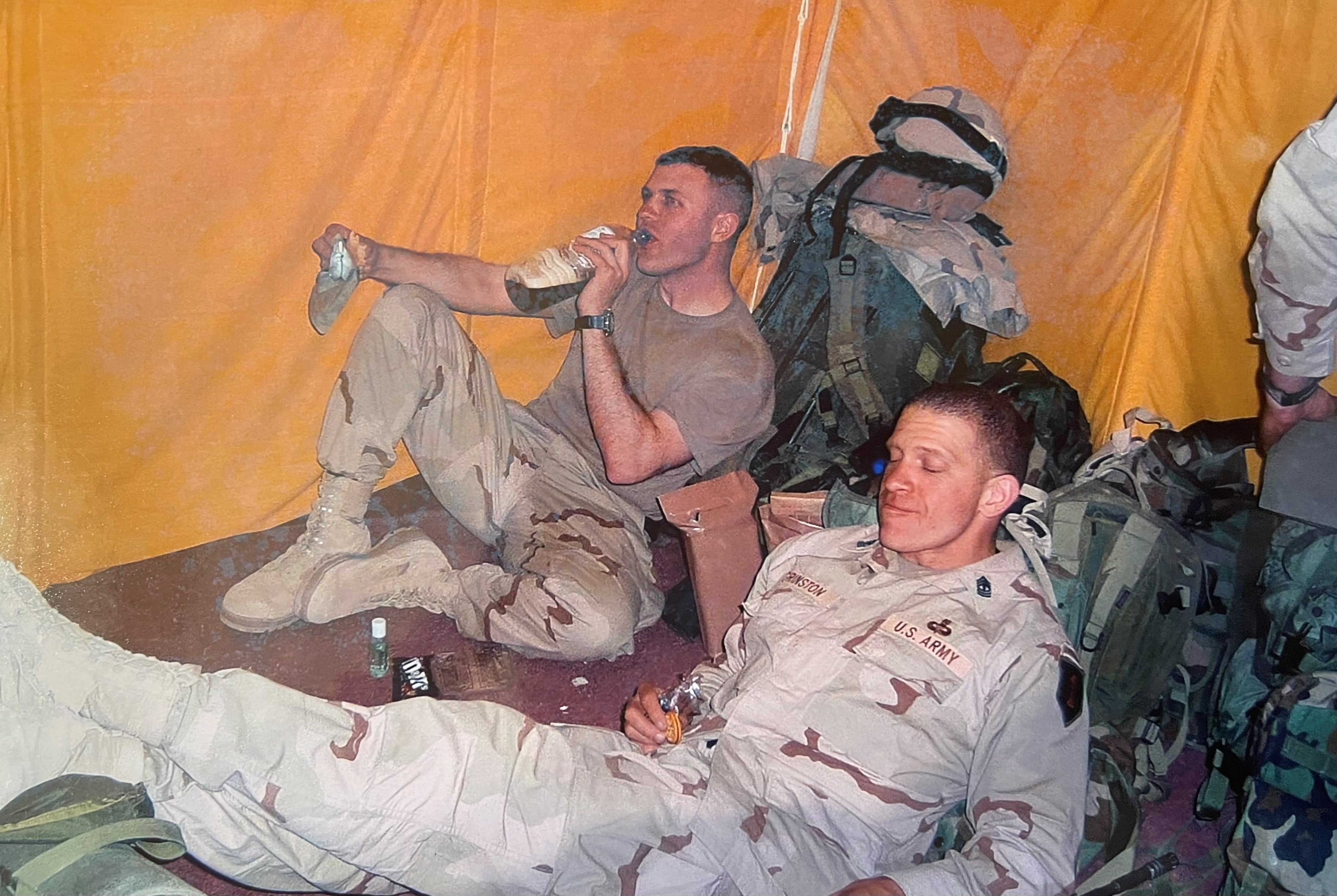
In less than a year they would be transformed from cannon-cockers to foot soldiers and headed into an obscure but deadly area in the town of Bayji, Iraq, on the road between Baghdad and Mosul.
Throughout 2004, mission after mission they faced ambushes, roadside bombs and attacks that even the invasion force hadn’t seen.
One officer asked Grinston not to come with them, fearing bad luck because when he was around, they got shot at.
“Okay, sir is it because I get shot at a lot or I’m at the spots where I know it’s gonna be a tough mission?” Grinston said.
The hardest day for the unit and for Grinston’s entire career, which would ultimately include two tours in Iraq and two in Afghanistan, was Good Friday, April 9, 2004 with Charlie Battery, 1st Battalion, 7th Field Artillery Regiment, 1st Infantry Division.
That was the day that three of his soldiers died in an L-Shaped ambush in Bayji. Multiple accounts and a Bronze Star Medal citation with a “V” for valor would later attest that Grinston was in the thick of it and braved the attack to retrieve body parts of his fallen comrades.
One of the fallen was Staff Sgt. Toby Mallet, 26, from Kaplan, Louisiana. Mallet had joined the deployment late, staying in Germany with his wife and 2-year-old son Justin as they awaited the birth of their second child.
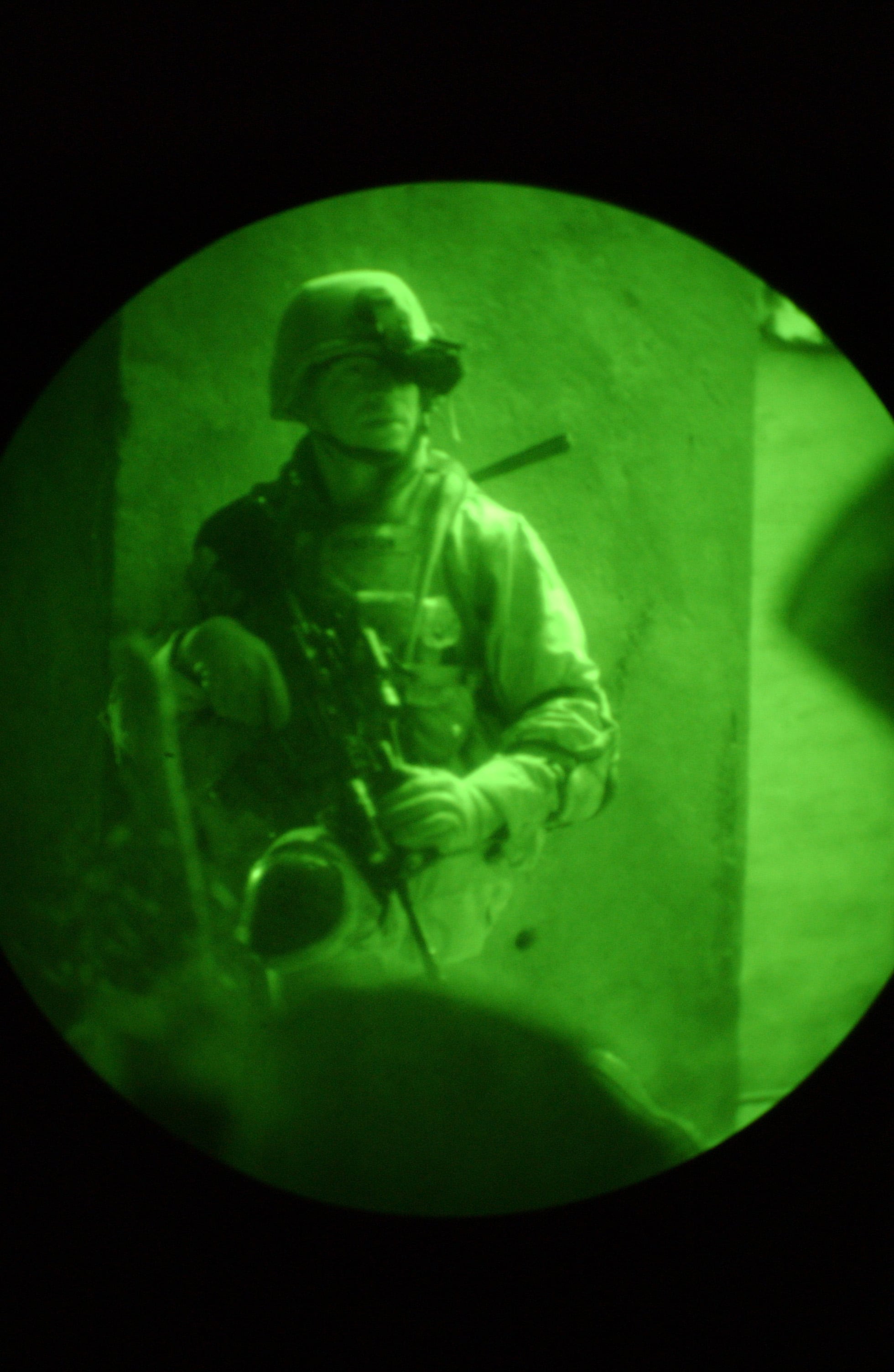
Fifteen years later, Grinston stood in his camouflage field uniform, hands clasped in front of him in a small dining room inside El Zapata, a Mexican restaurant on Fort Benning, Georgia.
A shorn-headed, baby-faced private in his white shirt, blue trousers and sporting a brand-new blue infantry braid tucked around his right shoulder rounded the corner.
“Hello,” Grinston said, stepping forward to shake the private’s hand.
The new soldier froze, a smile widening as he came to parade rest.
“Hello sergeant major,” Pvt. Justin Mallet said.
“How are you?” Grinston said.
“Good and you?” Mallet said as the pair shook hands.
The moment was captured by Dignan, the once-lieutenant nearing his 40s. This handshake may remain forever frozen in pixels. It lingers deeper in the touch that bridges decades and their shared loss.
The video footage of Justin Mallet and Grinston was not posted to social media.
The year leading up to the 2004 deployment was a blur, constant training and little talk about what Toby would face, Saskia Mallet said. But Toby’s first sergeant, Grinston, was a steady presence, that much he told her. Her husband served about a week in combat and then he was gone.
As the months passed, the unit was there, the other families, the other soldiers. It would be a while before they returned from Iraq, but they stayed with her and the others. Saskia, a native of Germany, moved her two boys to Kaplan, to raise them where Toby had lived.
When asked what seeing Justin meant to him, Grinston paused, saying that being there for Justin, Toby’s son, was the least he could do.
“So, if I look back and wish I would have spent more time connecting with my old battery…,” he said. “And as you get closer to the end you think about those times, and I got so busy and deployed again and again and again…there’s no excuses. But I didn’t stay in touch with the families as much as I should have, even if, at all. Just kept getting more families that had soldiers that were killed on my watch.”
Saskia struggled with how to describe Grinston’s and the other soldiers’ response.
“The fact that they even think about it, and regret things… or not doing things, makes me sad because I think they did everything they could…and I always knew they were there for me.”
She knew Grinston would be there for Justin’s graduation. Justin didn’t.
“He didn’t have his dad there, but he had everybody else,” Saskia said. “That was very humbling actually. That was the saddest and happiest day of my life.”
The digital tools, email, Twitter, Facebook, Instagram, and Reddit, among other messaging methods such as interviews with reporters, public advertisements and appearances gave Grinston a way to showcase a leadership style he’s grown into over nearly all his adult life.
Grinston and his advisors have navigated the channels, learning what works and what doesn’t. Facebook is a little too niche in its groups but also too open to trolls that have no stake in Army life other than to lob ungrounded opinions. Instagram is similar but sometimes more toxic. Twitter grabs headlines and has its uses, but ultimately is the zone of influencers, media, official messaging, and snarky response.
The one platform that’s yielded the most return for Grinston has been Reddit. It’s a place where often the comments are better managed, those participating are in the Army and know Army life.
Grinston responds directly to emails from the lowest of ranks. That alone would have been unheard of even a few years ago, said Command Sgt. Maj. Osvaldo Martinez, former head of enlisted for the Judge Advocate General Corps served under Grinston since January 2021 guiding his work on the People’s First Task Force.
This approach has its critics. Some say that noncommissioned officers should be handling these gripes, verifying the problems. But a corporal, sergeant or even a sergeant first class has only so much pull.
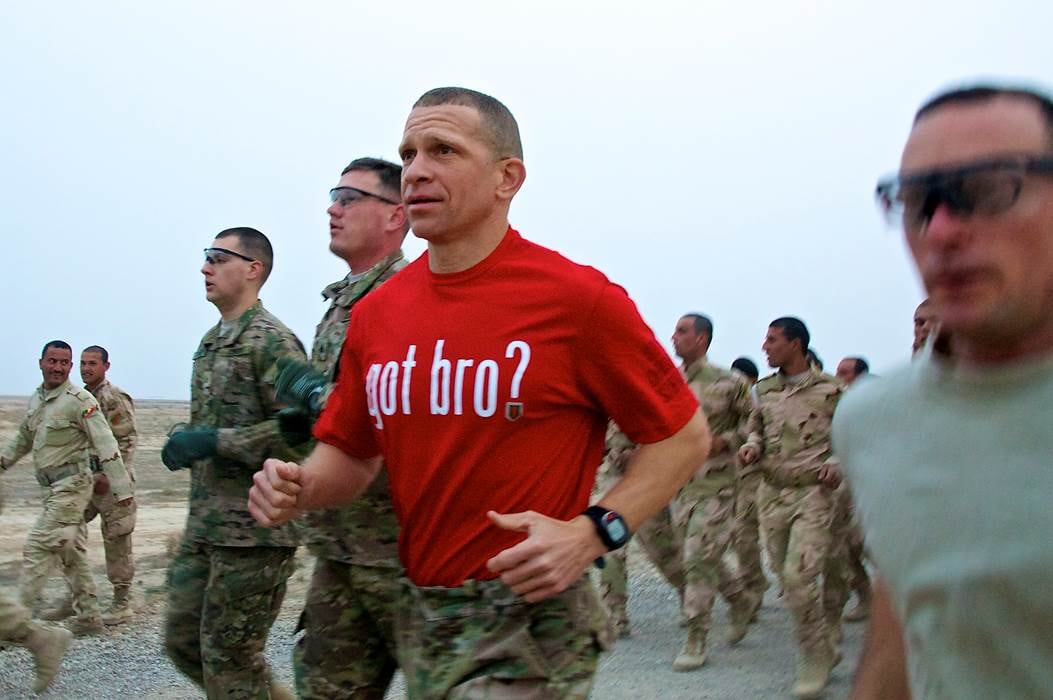
On the last day of June, Grinston faced a room of more than 200 sergeants major. At the annual Nominative Sergeants Major Solutions Summit, in Alexandria, Va., a gathering of the sergeants major and command sergeants major who work directly for a general officer.
They’d spent the past week digging deep, trying to solve some of the most vexing problems the Army has faced for years, from suicide to alcohol abuse to recruiting, turning the dial a click at a time, always pushing for more.
He quipped throughout, a rib-nudging joke, a sly smile, a quick criticism or cut to put one of these career soldiers in their place while also lifting them up.
Grinston called out a pilot project that lifted barracks alcohol restrictions at Fort Bliss, Texas, and saw reductions in negative incidents. Grinston himself leans more toward the likelihood that it wasn’t only the lifted restrictions, but that worried noncommissioned officers visited the barracks more often to keep watch over their soldiers.
The lifted restriction? Grinston told the group of more than 200 of his sergeant major peers, that the suggestion came from a soldier on Reddit.
At the end of the summit, Grinston stands before this room of his peers, he pauses, his shoulders slouched slightly, one hand in the pocket of his tan slacks, the other holding a microphone.
He tells them that at some point he’d likely fought or trained in some dirt patch somewhere with each of them, whether they knew it or not, and somebody in here probably saved his life.
He talks about how he barely slept the first few weeks as the Army’s sergeant major.
He talks about how he didn’t think he could make it past the first of four years.
He talks about those he lost and how it haunts him every day.
And then he tells a story.
Earlier this year, he stood outside one of the congressional buildings in Washington D.C. waiting on a ride back to the Pentagon. A civilian walked by, not knowing him from any other soldier and said, “Thank you for your service.”
Grinston said thank you, or thank you for your support, or some generic thing, he doesn’t quite remember. But then, the civilian walked back, looked at him and said he’s heard that some veterans, and soldiers are offended by that statement.
The man asked what he thought. Grinston thought to himself how he’s never been asked that question.
“What do you think?” the man asked.
“I said, well I’m not offended by it… we just don’t really know what to say,” Grinston said. “And then I looked at him and I said, ‘it doesn’t matter what I say but you’re worth it.’”
The man looked as though he would cry. And the man thanked him again.
Grinston shifts to his audience, his friends.
“And when I’m standing in front of this group when I look back at 35-36 years would I do it again?” he said, before adding,
“Because everybody in this room is worth it.”
CORRECTION: This article has been updated to accurately reflect the military occupational specialties of Pvt. Robert Booker and Staff Sgt. Stevon Booker, the shared namesake of the M10 Booker.
Todd South has written about crime, courts, government and the military for multiple publications since 2004 and was named a 2014 Pulitzer finalist for a co-written project on witness intimidation. Todd is a Marine veteran of the Iraq War.





